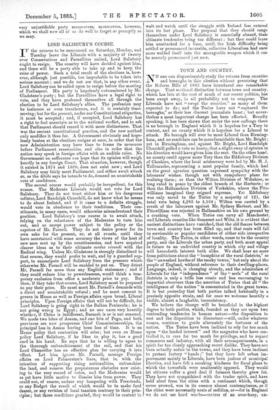LORD SALISBURY'S COURSE.
IF the returns to be announced on Saturday, Monday, and Tuesday leave the Liberals with a majority of twenty over Conservatives and Parnellites united, Lord Salisbriry ought to resign. The country will have decided against him, and there will be a party able to take up and to keep the reins of power. Such a total result of the elections is, how- ever, although just possible, too improbable to be taken into serious account ; and we do not see that, in any other event, Lord Salisbury can be called upon to resign before the meeting of Parliament. His party is hopelessly outnumbered by Mr. Gladstone's party ; but the Parnellites have a legal right to vote, and they have professed themselves all through the election to be Lord Salisbury's allies. The profession may be insincere or even treacherous, and it is certainly time- serving; but for the present, under our Constitutional etiquettes, it must be accepted ; and, if accepted, Lord Salisbury has a right to feel uncertain as to the national verdict, and to ask that Parliament should record it with more distinctness. That was the ancient constitutional practice, and the new method only modifies it thus far. A Government obviously and hope- lessly beaten at the elections resigns at once, in order that the new Administration may have time to frame its measures before Parliament reassembles, and also in order that the nation may speak in foreign affairs with an audible voice. No Government on sufferance can hope that its opinion will weigh heavily in any foreign Court. That situation, however, though it existed in 1874 and 1880, does not exist now ; and Lord Salisbury may fairly meet Parliament, and either await attack or, as the Globe says he intends to do, demand an unmistakable vote of confidence.
The second course would probably be inexpedient, for this reason. The Moderate Liberals would not vote for Lord Salisbury. They do not trust either him or his dangerous adlatus, Lord Randolph Churchill, do not know what he means to do about Ireland, and if it came to a definite struggle, would vote in obedience to their traditions. Their con- stituents, in many cases, would otherwise misunderstand their position. Lord Salisbury's true course is to await attack, relying on the reluctance of the Moderates to turn him out, and so accept power subject to the policy or the caprices of Mr. Parnell. They do not desire power for its own sake for the present, or, at all events, until they have ascertained with some accuracy the views of the host of new men sent up by the constituencies, and have acquired clearer ideas as to their ultimate modus vivendi with the Radical wing. Unless Mr. Gladstone is strongly disinclined to that course, they would prefer to wait, and by a guarded sup- port, to emancipate Lord Salisbury from the pressure which otherwise Mr. Parnell will be enabled to put on. They detest Mr. Parnell far more than any English statesman ; and if they could reduce him to powerlessness, would think a tem- porary exclusion from office a moderate price to pay. But then, if they take that course, Lord Salisbury must be prepared to pay their price. He must meet Mr. Parnell's demands with a direct and unmistakable refusal ; and he must consent to govern in Home as well as Foreign affairs upon broad, Liberal principles. Upon Foreign affairs that will not be difficult, for Lord Salisbury is going right in the Balkan Peninsula ; he is not going wrong in Egypt ; and no one cares very heartily whether, if China is indifferent, Burmah is or is not annexed. We made two bites of Assam, and one bite of Pegu, and both provinces are now prosperous Chief Commissionerships, the principal loss in Assam having been loss of time. It is on Horne policy that contention will arise ; but even on Home policy Lord Salisbury, if he likes to play it, has a good card in his hand. He says that he is willing to agree to the thorough enfranchisement of the soil, and that his Lord Chancellor has an effective plan for carrying it into effect. Let him ignore Mr. Parnell, manage Foreign affairs on Lord Palmerston's lines, that is, with the intention of supporting rising nationalities, enfranchise the land, and remove the preposterous obstacles now exist- ing to the easy record- of votes, and the Moderates would as yet have little motive to dismiss him from power. They could not, of course, endure any tampering with Free-trade, or any Budget the result of which would be to make food dearer, or any revision of local taxation contrary to their prin- ciples; but those conditions granted, they would be content to
wait and watch until the struggle with Ireland has entered into its last phase. The proposal that they should range themselves under Lord Salisbury is essentially absurd, their ultimate tendencies being too different ; but they could leave him unattacked for a time, until, the Irish difficulty being settled or pronounced incurable, collective Liberalism had once more welded itself into the manageable weapon which it can be scarcely pronounced just now.






































 Previous page
Previous page